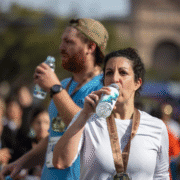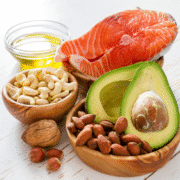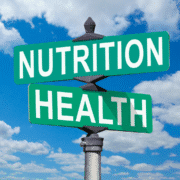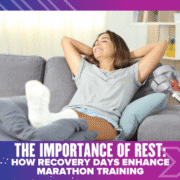Nutrition Myths Busted: What Runners Really Need to Eat
As marathoners, we’re often bombarded with nutrition advice from all directions. From pre-race fuel to post-run recovery meals, there’s a constant stream of opinions about what you should and shouldn’t eat to optimize your performance. While it’s important to nourish your body with the right foods, not all nutrition advice is created equal. Today, we’re setting the record straight by debunking some of the most common nutrition myths for marathoners.
Myth 1: Carbs Are the Enemy
Busted: If you’re training for a marathon, carbs are your best friend.
There’s a misconception that carbohydrates are something to be avoided, but for runners, carbs are a primary source of energy. During long runs and intense training, your body relies on glycogen (stored carbohydrates) to power through. Cutting carbs too drastically can leave you feeling fatigued and depleted, especially when race day approaches. Instead of fearing carbs, focus on the quality of the carbs you’re consuming. Opt for whole grains, fruits, vegetables, and legumes to fuel your body properly. A balanced intake of healthy carbs will ensure that you have the energy to run your best race.
Myth 2: Protein Is Only for Weightlifters
Busted: Protein is essential for marathoners too.
While protein is often associated with strength athletes, it’s just as important for runners, especially marathoners. Protein helps with muscle repair and recovery, both of which are crucial after long runs and hard workouts. You don’t need to consume massive amounts of protein, but ensuring that each meal includes a moderate portion will help your muscles rebuild and grow stronger. Aim for lean sources like chicken, fish, tofu, beans, and dairy to support your training and recovery.
Myth 3: You Don’t Need to Worry About Hydration Until You’re Thirsty
Busted: Hydration needs to be managed proactively.
Waiting until you’re thirsty to hydrate is a recipe for disaster when training for a marathon. By the time you feel thirsty, you’re already slightly dehydrated. Proper hydration is essential for performance, helping to regulate body temperature, maintain muscle function, and prevent cramping. Be sure to drink water consistently throughout the day and during your runs. For longer runs (over an hour), consider adding an electrolyte drink to replenish lost salts and minerals.
Myth 4: Fats Should Be Avoided
Busted: Healthy fats are vital for endurance athletes.
Fat often gets a bad rap in the world of nutrition, but not all fats are created equal. Healthy fats from sources like avocados, nuts, seeds, and olive oil play an essential role in keeping your body fueled and your joints healthy. Healthy fats provide long-lasting energy, which is especially important during the later stages of a marathon. They also help with inflammation and muscle recovery. So don’t shy away from fats; just be sure to choose the right ones.
Myth 5: Pre-Race Meals Should Be All About Pasta
Busted: A balanced pre-race meal is key.
It’s a classic pre-race tradition to indulge in a giant plate of pasta, but it’s not the only option for marathoners. While pasta is a good source of carbs, variety is important. Your pre-race meal should focus on a balanced mix of carbohydrates, protein, and healthy fats. If pasta isn’t your thing, consider options like rice, quinoa, sweet potatoes, or even a sandwich with lean protein and vegetables. Aim to eat this meal about 3-4 hours before the race to allow your body time to digest and store energy.
Myth 6: You Only Need to Focus on Nutrition During Long Runs
Busted: Daily nutrition matters just as much as race day nutrition.
It’s easy to get caught up in thinking that nutrition only matters when you’re logging long miles. In reality, what you eat on a daily basis has a significant impact on your overall training and performance. A well-rounded diet, with proper hydration, will keep you energized and ready for training. Ensure that you’re getting a mix of protein, carbs, and healthy fats in each meal to support muscle growth, endurance, and recovery. Consistency in your diet helps prevent injuries and keeps your body strong throughout your training cycle.
Myth 7: Supplements Are the Secret to Success
Busted: Real food should always come first.
Supplements can be helpful in some cases, but they should never replace a healthy, balanced diet. The key to good nutrition lies in whole foods, which provide a wide array of vitamins, minerals, and other nutrients that supplements can’t fully replicate. If you’re considering taking a supplement, make sure to consult with a healthcare provider to ensure that it’s necessary and beneficial to your specific needs.
Conclusion: Trust Your Nutrition to Fuel Your Success
When it comes to marathon nutrition, there’s no one-size-fits-all approach. However, focusing on balanced meals that prioritize whole foods—carbs, protein, fats, and hydration—will give you the fuel you need to perform your best. Don’t get distracted by popular myths or quick fixes. The key to marathon success is consistency, balance, and listening to your body.
So, the next time you lace up your shoes and hit the pavement, remember that what you put in your body can be just as important as the miles you log. Keep fueling up with real, whole foods, and you’ll be ready to crush your marathon goals.
Happy running!







